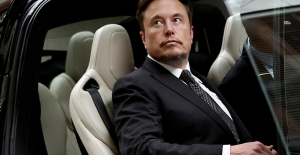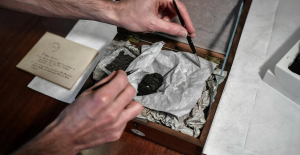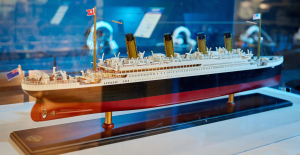Taiwan on Tuesday put fighter jets and its navy on alert in response to a Chinese military operation. Additionally, missile systems were activated after China deployed 34 military aircraft and nine warships nearby. Taiwan's Defense Ministry said Chinese planes flew over the unofficial buffer zone between the two countries on Tuesday.
Shortly before, NATO Secretary General Jens Stoltenberg had warned during a visit to Japan that China's growing assertiveness and its cooperation with Russia posed a threat not only to Asia but also to Europe. China regards the democratically governed Taiwan as part of its national territory and repeatedly threatens to take the island republic by force.
Michael J. Cole once worked for Canada's Internal Security Agency and has lived in Taiwan for 17 years. The analyst is currently researching for the Global Taiwan Institute, a think tank headquartered in Washington. In an interview with WELT in Taipei, the expert explains how real the danger of an invasion is - and why the West must not stay out of the conflict.
WORLD: How tense is the relationship between China and Taiwan at the moment?
Michael J. Cole: Tension in the Taiwan Strait is at its highest level in a long time. The Chinese leadership is annoyed that Taiwan is successfully building ties with the international community and defying annexation. This comes despite Beijing's attempts to isolate Taiwan internationally. Since 2016, China has poached Taiwan's official diplomatic allies and interfered when the country tried to conclude free trade agreements.
WORLD: How likely is a Chinese attack or invasion in the next few years?
Cole: I don't think we're going to see a Chinese war of aggression anytime soon. The provocations of the last few months have been mainly psychological warfare or "grey zone" operations. They are an attempt by China to force Taiwan's supporters and potential partners to choose Beijing. This is how Taiwan is to be isolated. But the plan didn't work out. So I would say that despite growing military pressure, Taiwan is in a pretty good position internationally because a number of major countries understand that Chinese military action should not be deterred.
WORLD: Nevertheless, only 13 countries and the Vatican still recognize Taiwan as an official state. Is the support for Taipei mostly symbolic?
Cole: One of Beijing's conditions for maintaining or establishing official diplomatic relations is to withdraw Taiwan as a sovereign state. Given a choice, I would wager that the vast majority of countries would have official diplomatic relations with both. But Beijing is not allowing this at the moment. Most countries therefore have Taiwanese branches that resemble an embassy. They are not then called “messages”, but they fulfill similar functions. This engagement with Taiwan certainly contributes to China's resilience and deterrence.
WORLD: Despite all these international connections, can Taiwan rely on US assistance in the event of a Chinese attack?
Cole: The US has a strategy of "strategic ambiguity" that does not guarantee military support for Taiwan in the event of an attack. Now, President Biden is said to have misread official US policy three times in the past year when he said the US would come to Taiwan's aid. Whether this is a change in official policy remains to be seen, but Biden's statement is significant. There is strong cooperation between the American and Taiwanese militaries that has existed for decades. It is likely that the US would play a role in a military emergency, primarily by contributing to deterrence. But a growing number of other countries, such as Japan, Australia, the European Union, and possibly India as well, are giving serious thought to what their role would be if armed conflict erupted.
WORLD: Does the Taiwanese military have a chance against China without guaranteed external help?
Cole: Taiwan has been preparing for an attack for decades and would also be able to hit targets in China. The Chinese military still faces many challenges in waging war in a high-tech environment. Also, it is very difficult to cross 120 kilometers of water to conquer an island. It was easier for Russia to cross the border into Ukraine. Occupying Taiwan is not as easy as it is often made out to be.
WORLD: Why should Germany and Europe be interested in the conflict between China and Taiwan?
Cole: One reason is of course the semiconductors, without which no cars, laptops or smartphones can be produced. But the main reason should be that every freedom-loving country, every democracy, should be interested in the fate of similar countries because they represent an alternative to authoritarian states like China. Taiwan is one of those rare, highly successful experiments in which democratization and economic modernization are going hand in hand. It is an example for many other countries. If these examples are erased and large authoritarian countries encouraged to target other successful experiments, who will be next? Germany, the European Union, the USA, Canada and Australia must send very clear signals to Beijing that this behavior is unacceptable.
WORLD: The German government will publish a new "China strategy" this year, which describes the People's Republic as a "system rival".
Cole: There are fewer and fewer democracies around the world. Germany speaks of system competition with China, the USA speaks of ideologies competing against each other. But ultimately we are talking about two countries that are compatible in certain areas but highly incompatible in others. And Taiwan falls into a category that is very Western liberal.
WORLD: The Taiwanese have been living with the threat to China for decades. Does that make them jaded, or is the threat of war a big issue in the country?
Cole: Taiwanese talk a lot about politics. They are aware that China poses a threat to their freedom and way of life. But are they obsessed with the subject? no Are you scared? Are you panicking? Absolutely not. Taiwanese are quite pragmatic. At the same time, I would say that the fact that China has been threatening them for decades but has never attacked leads some people to conclude that this momentum will continue indefinitely. But since Russia invaded Ukraine, many think differently. Since then, Taiwanese have known that we cannot assume indefinitely that leaders like Xi Jinping act rationally, as we understand them. Taiwanese have to be prepared for anything.

 B:SM will break its investment record this year with 62 million euros
B:SM will break its investment record this year with 62 million euros War in Ukraine: when kyiv attacks Russia with inflatable balloons loaded with explosives
War in Ukraine: when kyiv attacks Russia with inflatable balloons loaded with explosives United States: divided on the question of presidential immunity, the Supreme Court offers respite to Trump
United States: divided on the question of presidential immunity, the Supreme Court offers respite to Trump Maurizio Molinari: “the Scurati affair, a European injury”
Maurizio Molinari: “the Scurati affair, a European injury” Irritable bowel syndrome: the effectiveness of low-carbohydrate diets is confirmed
Irritable bowel syndrome: the effectiveness of low-carbohydrate diets is confirmed Beware of the three main sources of poisoning in children
Beware of the three main sources of poisoning in children First three cases of “native” cholera confirmed in Mayotte
First three cases of “native” cholera confirmed in Mayotte Meningitis: compulsory vaccination for babies will be extended in 2025
Meningitis: compulsory vaccination for babies will be extended in 2025 When traveling abroad, money is a source of stress for seven out of ten French people
When traveling abroad, money is a source of stress for seven out of ten French people Elon Musk arrives in China to negotiate data transfer and deployment of Tesla autopilot
Elon Musk arrives in China to negotiate data transfer and deployment of Tesla autopilot Patrick Pouyanné, CEO of TotalEnergies, is very reserved about the rapid growth of green hydrogen
Patrick Pouyanné, CEO of TotalEnergies, is very reserved about the rapid growth of green hydrogen In the United States, a Boeing 767 loses its emergency slide shortly after takeoff
In the United States, a Boeing 767 loses its emergency slide shortly after takeoff A charred papyrus from Herculaneum reveals its secrets about Plato
A charred papyrus from Herculaneum reveals its secrets about Plato The watch of the richest passenger on the Titanic sold for 1.175 million pounds at auction
The watch of the richest passenger on the Titanic sold for 1.175 million pounds at auction Youn Sun Nah: jazz with nuance and delicacy
Youn Sun Nah: jazz with nuance and delicacy Paris Globe, a new international theater festival
Paris Globe, a new international theater festival Skoda Kodiaq 2024: a 'beast' plug-in hybrid SUV
Skoda Kodiaq 2024: a 'beast' plug-in hybrid SUV Tesla launches a new Model Y with 600 km of autonomy at a "more accessible price"
Tesla launches a new Model Y with 600 km of autonomy at a "more accessible price" The 10 best-selling cars in March 2024 in Spain: sales fall due to Easter
The 10 best-selling cars in March 2024 in Spain: sales fall due to Easter A private jet company buys more than 100 flying cars
A private jet company buys more than 100 flying cars This is how housing prices have changed in Spain in the last decade
This is how housing prices have changed in Spain in the last decade The home mortgage firm drops 10% in January and interest soars to 3.46%
The home mortgage firm drops 10% in January and interest soars to 3.46% The jewel of the Rocío de Nagüeles urbanization: a dream villa in Marbella
The jewel of the Rocío de Nagüeles urbanization: a dream villa in Marbella Rental prices grow by 7.3% in February: where does it go up and where does it go down?
Rental prices grow by 7.3% in February: where does it go up and where does it go down? Even on a mission for NATO, the Charles-de-Gaulle remains under French control, Lecornu responds to Mélenchon
Even on a mission for NATO, the Charles-de-Gaulle remains under French control, Lecornu responds to Mélenchon “Deadly Europe”, “economic decline”, immigration… What to remember from Emmanuel Macron’s speech at the Sorbonne
“Deadly Europe”, “economic decline”, immigration… What to remember from Emmanuel Macron’s speech at the Sorbonne Sale of Biogaran: The Republicans write to Emmanuel Macron
Sale of Biogaran: The Republicans write to Emmanuel Macron Europeans: “All those who claim that we don’t need Europe are liars”, criticizes Bayrou
Europeans: “All those who claim that we don’t need Europe are liars”, criticizes Bayrou These French cities that will boycott the World Cup in Qatar
These French cities that will boycott the World Cup in Qatar MLS: new double for Messi who offers victory to Miami
MLS: new double for Messi who offers victory to Miami PSG-Le Havre: Ramos on his way, Kolo Muani at the bottom of the hole… Favorites and scratches
PSG-Le Havre: Ramos on his way, Kolo Muani at the bottom of the hole… Favorites and scratches Football: Vasco da Gama separates from its Argentinian coach Ramon Diaz
Football: Vasco da Gama separates from its Argentinian coach Ramon Diaz F1: for the French, Ayrton Senna is the 2nd best driver in history ahead of Prost
F1: for the French, Ayrton Senna is the 2nd best driver in history ahead of Prost

















